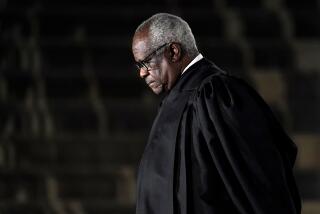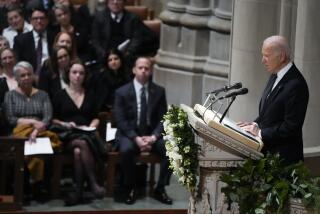Brennan: Justice for All
- Share via
Justice William Brennan, who resigned his seat on the Supreme Court Friday, has been a towering figure in the history of American jurisprudence. The force and elegance of his many landmark opinions--though sometimes controversial--have made him one of the 20th Century’s most influential Americans. They will stand as an enduring testament to the fundamental notion that law, untempered by humanity, is an instrument of coercion and not of justice.
Many scholars rank the 84-year-old son of Irish Catholic immigrants as the greatest justice since John Marshall because, as Burt Neuborne put it, “Brennan knew how to blend his political instincts with a pervasive legal theory that transcended his personal views.”
According to Brennan, that theory derived from his belief that the Constitution’s fundamental purpose is “the protection of the dignity of the human being and the recognition that every individual has fundamental rights which government cannot deny him.” As he once said, “The genius of the Constitution rests not in any static meaning it might have had in a world that is dead and gone, but in the adaptability of its great principles to cope with current problems and current needs. The Constitution will endure as a vital charter of human liberty as long as there are those with the courage to defend it, the vision to interpret it and the fidelity to live by it.”
Though he certainly had critics who felt his philosophies were far too liberal, Brennan’s influence was acute in cases involving freedom of expression, the rights of individuals accused of crimes and the 14th Amendment’s guarantee of “equal protection of the laws.” Brennan said he followed in the tradition of Chief Justice Earl Warren, who, Brennan said, always was concerned with people, “especially ordinary people--the disadvantaged, the downtrodden, the poor, the friendless.”
So, too, was Brennan, whose retirement brings to mind the sentiments of another Irishman, William Butler Yeats: I am in despair that time may bring/Approved patterns of women or of men/But not that selfsame excellence again.
More to Read
Get the L.A. Times Politics newsletter
Deeply reported insights into legislation, politics and policy from Sacramento, Washington and beyond. In your inbox twice per week.
You may occasionally receive promotional content from the Los Angeles Times.









